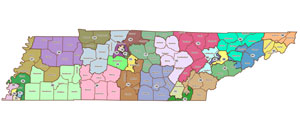by David Callis, Executive Vice President and General Manager for the Tennessee Electric Cooperative Association
Near the end of “Saving Private Ryan,” as Tom Hanks’ character is dying, he leans forward and mutters one last command to the young private: “Earn this.” He speaks the words after most of his men have died saving the private’s life. He speaks the words to the soldier in an effort to convey the magnitude of the sacrifice made on his behalf.
Moving forward with a new team in place for 2012, “Earn this” is our internal watchword at the Tennessee Electric Cooperative Association.While not as dramatic as a life-or-death struggle, the foundation on which we’re building involves a legacy that began in the 1930s.Early cooperative leaders were more than pioneers. The tactics they used were revolutionary, and the business acumen they possessed was cutting edge. Investor- owned utilities and legislators first ignored them and then tried to run them out of business. The co-op organizers took them on — and won. They were fighting for a better life for themselves, their children and their communities.
More than 70 years later, those cooperative principles and goals remain unchanged.Whether the work was done in the 1930s or the 1990s, we have a legacy of service and commitment that is to be earned — not squandered. Just like our predecessors from the ’30s, we’re committed to using nothing less than the best tools and technologies available to us today. Though the methodology is dramatically different — electronic social media has replaced the telephone party line — the basic principles of our business model remain the same.
As we move forward at TECA, we’re aware of our task, and we have our focus Squarely on you — the co-op members.In addition to publishing The Tennessee Magazine, TECA provides energy marketing assistance and a variety of education and training to today’s cooperative leaders. We also coordinate legislative efforts to protect the interests of the electric cooperative members in the state.
Those black-and-white images of the past serve as silent sentinels that repeat the charge to earn their sacrifice — a charge that we embrace with a tremendously talented group of employees with more than 160 years of varied experiences working on behalf of rural Tennessee. That background and commitment power our progress as we work for you — for the next 70 years and far beyond.
Our leadership team:
Robin Conover, vice president of communications and editor of The Tennessee Magazine; Mike Knotts, director of government relations; Todd Blocker, director of member relations; Trent Scott, communications coordinator.
Chris Kirk, Ron Bell and Susan Pilgreen round out the staff of The Tennessee Magazine. Amy Jordan, Tina Smith, Andrea Knight and Miyuki Fowler provide accounting, human resources and administrative support.
As for myself — I have more than 25 years of public power background. My decade of work as TECA director of government relations was preceded by service at Tri-County Electric in Lafayette and the Tennessee Valley Authority in Chattanooga.
For much more information on TECA and bios of the employees that work on your behalf, click here.




